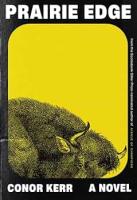
In his second standalone novel after the award-winning debut Avenue of Champions, published in 2021, Conor Kerr once again presents the lives of Métis people in Edmonton, Alberta: his own home town. Of mixed European and Indigenous ancestry with roots dating back to the early years of fur trading on this continent, the Métis are one of three Indigenous groups recognized in Canada’s constitution. Kerr's own Métis background informs his writing: suffusing this novel, like his first, with sensitivity to the experiences and challenges of contemporary Métis living in modern cities.
In this book, two young people—one brought up in a rural setting and college-educated, the other from downtown Edmonton and lacking any formal education beyond the eighth grade—join forces to transport bison out of a national park and into urban public spaces. By moving bison into Edmonton, they intend to raise awareness around the Land Back movement in western Canada: seeking to right the historical wrongs done to Métis and other Indigenous peoples by returning land to them. The idea is to transition from a European-derived paradigm of private ownership back to one of communal stewardship, with bison herds as living symbols of the change these activists hope to see.
Despite their optimism, throughout this book Kerr conveys a yawning sense of limbo: of permanent suspension in conditions which should be temporary. The mastermind of the bison plot, aptly named Grey, finds herself torn between an academic future which would involve walking away from, and effectively betraying, her Métis community; and a life with no means of professional fulfillment within that community. The limbo her cousin Ezzy experiences is even more tragic. The product of a child welfare system which separates children from their biological parents and places them in foster care because the parents have been raised in foster care themselves, Ezzy is and has always been unmoored: cut off from the network of generational support which should have been his birthright.
This story is alternatively quiet and larger-than-life. The author’s voice is compassionate, even as his characters make choices rife with moral ambiguity. Presentation of the circumstances in which they find themselves making these choices amounts to a powerful statement about the legacy of land seizures in North America.
